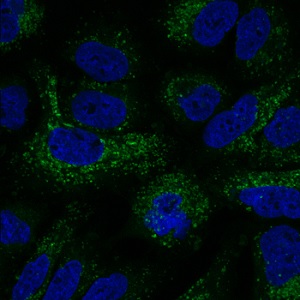 |
| Elevated cell recycling (green) in lung cancer cells treated with an established cancer drug. |
Scientists at the Salk Institute and Sanford Burnham Prebys Medical Discovery Institute designed a small molecule inhibitor to block the first step in the autophagy process, demonstrating its potential for starving tumor growth.
In a study published in Molecular Cell on June 25, the authors used the drug in combination with current chemotherapy drugs. "The finding opens the door to a new way to attack cancer," says Reuben Shaw from Salk, the senior author of the paper.
Since tumors grow faster than normal tissue their energy and metabolic requirements are greater. Autophagy is a process cells carry out to recycle damaged organelles and proteins providing nutrients for their own survival and allowing them to continue their function.
In the past Shaw's team had shown the importance of an enzyme, called ULK1, in the cell's autophagy machinery. They reasoned that inhibiting this protein may reduce autophagy in cancer cells, and squeeze their nutrient supply.
Fruitful collaboration with the other co-author of the study, Nicholas Cosford (SBP), narrowed the screening of hundreds of inhibitors against ULK1 down to a mere few. From this list a small molecule they named SBI-0206965 was taken forward as the most promising candidate. They report little effect on noncancer cells that require autophagy for normal maintenance.
"The key to success for this project came when we combined Reuben's deep understanding of the fundamental biology of autophagy with our chemical expertise; … this allowed us to find a drug that targeted ULK1 not just in a test tube but also in tumour cells," Cosford remarks.
While mTOR inhibitors (used in some cancer therapeutic regimens) activate cell recycling by turning off the ability for cells to absorb nutrients, it is now thought that this approach may lead to cancer cell dormancy, triggering drug resistance when treatment stops. "Inhibiting ULK1 would eliminate this last-ditch survival mechanism in the cancer cells and make existing anti-cancer treatments much more effective," notes Matthew Chun, a lead author and postdoctoral fellow at Salk.
Combining SBI-0206965 with an mTOR inhibitor showed two to three times more potency in killing lung cancer cells, compared to using either on their own.
They will now spend time to apply this cancer drug in different models of cancer as well as in further chemotherapeutic combinations. Adds Shaw: "In the meantime, this discovery gives researchers an exciting new toolbox for the inhibition and measurement of cell recycling."
- here's the release
- read the research abstract